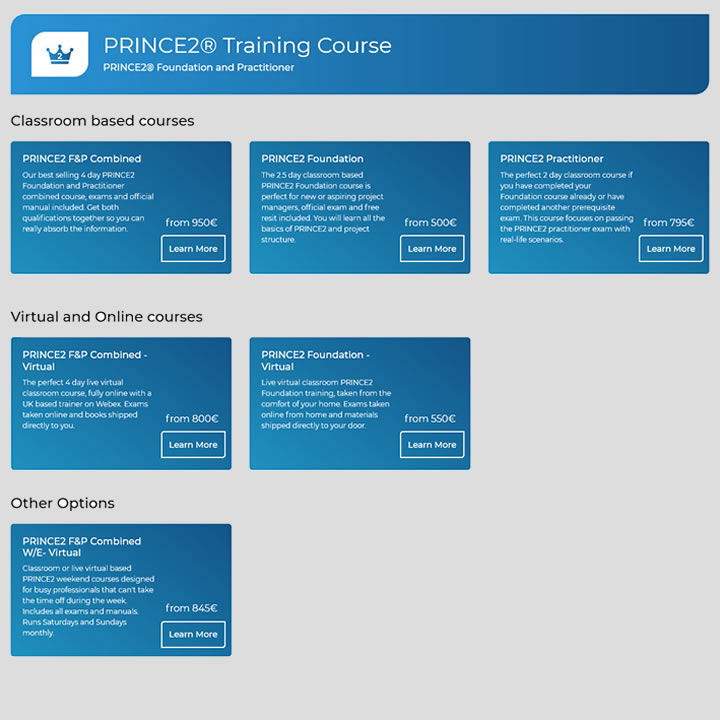A project is an effort that produces a unique product or service. It takes time, resources, and knowledge to reach a critical mass in a company that produces that product or service to meet customer demand. Project management is the process of harnessing everyone’s talents to create an efficient and cost-effective process. As on a Prince 2 courses and training Ireland.
If a process is worth a plug of its nut, then the project management process is worth a squeeze. Every business, product, service, and person are uniquely different. Regardless of shared values, alignments, or what has been defined as a project, it is still a process. If it is being managed, it is a project. If the process needs the project to produce a specific result, the project management system has a gap that can be filled (or enhanced).
Thinking about a process as a project is the key to developing a project management system for an ongoing process. One of the dangers of this is that the process is over- chrome-ered and lost sight of what the organization’s mission and vision are. An exceptional Project Management system is necessary for a company that wants to deliver a high-quality result at a good expense.
There are three types of projects: Strategic, operational, and developmental. Strategic projects are where an organization wants to reach some type of goal that they previously had set. These projects continue to move forward one step at a time.
This project management improves the chances of reaching the goal and provides leverage for the organization as a whole. This strategy cannot be rushed and does not accelerate decisions when something can’t be accomplished.
Operational projects are one step beyond strategic projects. This is where there are no longer strategic goals but operational steps towards reaching the goal. This Robert realignment strategy from the end of the business cycle and through the design process is commonly known as an optimization strategy.
A project is the network of organizations within an organization brilliantly combining resources to meet the incompatibility of find out what is and what can be. Those who worked together worked together.
Developmental projects, though, do things that cannot be done in other ways. This is what brings us to functional consulting…
Functional Consulting firms offer an entirely different approach from the constant stream of strategic consulting consultants. A functional project is a process change so that there is an immediate amelioration and implementation of any area of the business.
This process is often managed because the need to meet a business need is, though not always, specific to strategic goals, processes, or structure. The owner of a business will frequently outsource a project like this. These cost-savings in cost and process help create measurable execution factors.
The one thing to be aware of is that not every project needs to be lead by a specialist group. If the situation calls for them, a project team can usually work together. Working together, a project team can work to pull together all the different expertise that brings value to the project. While this requires an outside professional to provide professional input, it still is functional consulting.
Fundamentals of project management include:
- Defining the scope and sequence of events of the project
- Financial budgeting as the final result-focused in detail (the budget), for specific deliverables and at a specific completion milestoneOrganization and structure for the project
- Solution architecture for developing a communication structure ( calendars, email, meetings, written contracts, documentation)
- Procedure for planning activities (plan milestones, converse phase or meeting, write working documents, assumptions, budget WBS)
- Defining the scope and sequence of events of the project
- Financial budgeting as the final result-focused in detail (the budget), for specific deliverables and at a specific completion milestone
Organization and structure for the project
- Solution architecture for developing a communication structure ( calendars, email, meetings, written contracts, documentation)
- Procedure for planning activities (plan milestones, converse phase or meeting, write working documents, assumptions, budget WBS)
- Procedure for planning activities (plan milestones, converse phase or meeting, write working documents, assumptions, budget WBS)
- Procedure for planning activities (plan milestones, converse phase or meeting, write working documents, assumptions, budget WBS)
- Project monitoring (how is the project manager monitoring different stakeholders – schedule, cost and resource utilization, resources available, budget, qualified temp through pantry)
- Project monitoring (how is the project manager monitoring different stakeholders – schedule, cost and resource utilization, resources available, budget, qualified temp through pantry)
- Computational limited form analysis ( filling in the program from present to completion)
- Data analysis (gaining information from your sources)
- Program build and launch (is your organization ready to start the program)
- Project exit strategy (budget), conversely
- Project plan (timeline, critical path, deliverables)

